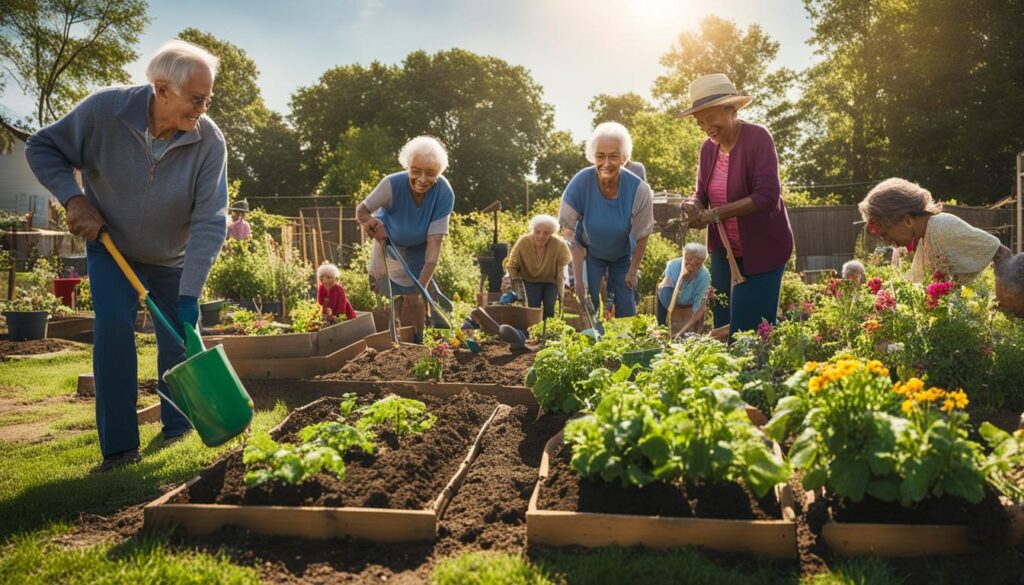In your 30s, it’s natural to want to leave a lasting impression on the world and create a meaningful legacy. This guide will provide you with strategic insights and action plans to establish a legacy in your 30s. By following four key steps along the timeline of your life, you can build a strong personal character, nurture family relationships, set and pursue meaningful goals, and give back to your community. These steps are crucial for creating a legacy that will stand the test of time.
Key Takeaways:
- Legacy Building at 30 can help you create a lasting impact on the world.
- Estate planning is an important aspect of building a legacy.
- Generational wealth management ensures a strong financial foundation for future generations.
- Charitable giving allows you to make a positive difference in your community.
Note: The image has been placed in the center to visually enhance the content.
Building your legacy is a lifelong journey that starts in your 30s. By following the steps outlined in this guide, you can establish a meaningful legacy that lasts beyond your lifetime. It’s important to reflect on your values, nurture family relationships, set and pursue meaningful goals, and give back to your community. Remember, finding purpose and creating a legacy is a personal and evolving process, so keep checking in, evolving, and growing. Start building your legacy today and make a lasting impact in the world.
Step 1: Build Strong Personal Character (Age: 18-30)
In your 30s, building a strong personal character is an essential step towards creating a lasting legacy. During the ages of 18 to 30, it’s crucial to focus on self-awareness, resilience, and personal growth. By developing these qualities, you can lay a solid foundation for your future endeavors and leave a positive impact on those around you.
Developing self-awareness
To build a strong personal character, it’s important to reflect on your values and beliefs. Take the time to understand who you are, what you stand for, and what matters most to you. Self-awareness allows you to make conscious choices aligned with your core principles, leading to a more fulfilling and purposeful life.
Building resilience
Life is filled with challenges, and building resilience is crucial to overcome them. By managing stress and adversity, you can develop the mental and emotional strength needed to navigate difficult situations. Embrace setbacks as opportunities for growth and use them as stepping stones towards personal development.
Pursuing personal growth
Continuous learning and personal growth are key components of building a strong personal character. Embrace new experiences, seek out knowledge, and challenge yourself to step outside of your comfort zone. By pursuing personal growth, you not only expand your horizons but also develop the skills and qualities necessary for leaving a lasting legacy.
Summary
The first step in building your legacy in your 30s is to focus on building a strong personal character. Develop self-awareness to align your actions with your values, build resilience to overcome obstacles, and pursue personal growth to continuously evolve and learn. By cultivating these qualities, you lay a solid foundation for the next steps in your journey towards creating a meaningful legacy.
Step 2: Nurture Family Relationships (Age: 31-50)
In your 30s and 40s, nurturing family relationships becomes a key aspect of building your legacy. This is the time to create strong bonds and meaningful connections that will last a lifetime. By investing time and effort into your family, you can create a loving and supportive network that will carry on your legacy for generations to come.
One important way to nurture family relationships is by creating family traditions. These traditions can be as simple as weekly game nights or annual family vacations. They provide an opportunity for everyone to come together, strengthen their bond, and create lasting memories. By sharing experiences and creating new traditions, you’re building a strong foundation of shared values and connections within your family.
Another way to nurture family relationships is by sharing wisdom and knowledge with younger generations. This can be done through regular conversations, storytelling, or even teaching practical skills. By passing down your experiences and life lessons, you’re providing valuable guidance that will shape the future of your family.
Lastly, creating a legacy plan is essential to ensure that your family’s legacy continues to thrive. This plan can include financial arrangements, such as setting up a trust or will, as well as passing down family heirlooms or businesses. A well-thought-out legacy plan allows you to leave a lasting impact on your family and ensures that your values and traditions are carried on.
Table: Importance of Nurturing Family Relationships
| Benefits | Examples |
|---|---|
| Stronger bond | Creating family traditions |
| Shared values | Regular conversations and storytelling |
| Guidance for future generations | Passing down wisdom and knowledge |
| Continuation of legacy | Creating a legacy plan |
Nurturing family relationships is crucial for building a legacy that extends beyond your own lifetime. By creating traditions, sharing wisdom, and having a solid legacy plan, you’re ensuring that your family’s values and connections remain strong. Take the time to invest in your family relationships and watch your legacy flourish.

Step 3: Set and Pursue Meaningful Goals (Age: 31-40)
In your 30s, setting and pursuing meaningful goals is a crucial step in building a lasting legacy. This is the time to define your purpose, take action, and embrace lifelong learning to make a real impact. By aligning your goals with your values and passions, you can lead a purpose-driven life and leave a lasting impression on the world.
Defining your purpose is the first step in setting meaningful goals. Take time to reflect on what truly matters to you and what you want to achieve in both your personal and professional life. Identify your passions and values, and use them as guiding principles for setting your goals.

Once you have defined your purpose, it’s time to take action. Break down your goals into smaller, actionable steps that you can work towards. This will help you stay focused and motivated as you make progress towards achieving your goals. Remember, small steps taken consistently over time can lead to significant results.
Embracing lifelong learning is also crucial in this stage of life. Continuously seek opportunities to develop new skills and expand your knowledge. This can be through formal education, online courses, workshops, or even self-study. By embracing lifelong learning, you will continue to grow both personally and professionally, enhancing your ability to make a meaningful impact.
Fulfilling Your Potential through Meaningful Goals
“The future belongs to those who believe in the beauty of their dreams.” – Eleanor Roosevelt
H3 tags are used here to emphasize the importance of fulfilling your potential through meaningful goals. Eleanor Roosevelt’s quote reminds us that our dreams and aspirations have the power to shape our future. By setting and pursuing meaningful goals, we can believe in our dreams and work towards making them a reality.
In summary, setting and pursuing meaningful goals in your 30s is a key step in building your legacy. Define your purpose, take action, and embrace lifelong learning. By aligning your goals with your values and passions, you can fulfill your potential and create a lasting impact in the world.
Step 4: Give Back to Your Community (Age: 51-70+)
As you enter the second half of your life, it becomes increasingly important to give back to your community and leave a positive impact. Finding a cause that you’re passionate about is the first step in making a difference. Whether it’s supporting a local charity, volunteering at a community center, or advocating for social change, your involvement can create meaningful change.
Being a positive role model is another way to give back to your community. By leading by example and demonstrating kindness, compassion, and integrity, you can inspire others to follow in your footsteps. Your actions and values can have a ripple effect, influencing those around you to make a difference as well.
“The best way to find yourself is to lose yourself in the service of others.” – Mahatma Gandhi
Beyond being a role model, you can also be an advocate for change. Use your voice and influence to raise awareness about important issues and promote positive social transformation. Whether it’s through writing, public speaking, or engaging in peaceful protests, your advocacy can help bring about systemic changes that benefit your community and future generations.
Table: Impact of Giving Back to Your Community
| Benefits | The Impact |
|---|---|
| Personal Fulfillment | Experience a sense of purpose and satisfaction by contributing to the well-being of others. |
| Positive Community Development | Contribute to the growth and improvement of your community, fostering a sense of unity and progress. |
| Empowerment | Inspire and empower those around you to take action and make a difference in their own lives and communities. |
| Legacy | Create a lasting impact that extends beyond your lifetime, leaving a positive legacy for future generations. |
Giving back to your community is a powerful way to leave a legacy that positively impacts those around you. By finding a cause you’re passionate about, being a positive role model, and advocating for change, you can make a difference and inspire others to do the same. Start today and be the change you want to see in the world.

Building Your Legacy Starts Now
Establishing a meaningful legacy and leaving a lasting impression is a journey that begins in your 30s. By following the steps outlined in this guide, you can start building your legacy today and make a significant impact on the world.
Your legacy starts with reflecting on your values and beliefs. Take the time to understand what truly matters to you and how you want to be remembered. This self-reflection will guide your decisions and actions as you embark on this lifelong journey.
Nurturing family relationships is another crucial aspect of building your legacy. By creating family traditions, sharing wisdom, and developing a legacy plan, you ensure that your impact extends beyond your lifetime. Your family will carry on your legacy, passing down your values and traditions to future generations.
To establish a meaningful legacy, it is essential to set and pursue meaningful goals. Define your purpose, take action, and embrace lifelong learning. By aligning your goals with your values and passions, you can make a lasting impact and fulfill your potential.
Lastly, giving back to your community is a powerful way to leave a lasting impression. Find a cause you are passionate about, be a positive role model, and advocate for change. Your contributions will make a difference and inspire others to get involved.
Remember, building your legacy is an ongoing process. Keep checking in, evolving, and growing as you establish a meaningful legacy that will endure beyond your lifetime. Start building your legacy now and create a lasting impact in the world.
FAQ
When should I start building my legacy?
The process of building your legacy can start at any age, but it’s particularly important to start in your 30s when you have the opportunity to shape your life and make conscious choices.
How can I build a strong personal character?
Building a strong personal character involves developing self-awareness, building resilience, managing stress and adversity, developing a growth mindset, building a support network, and pursuing personal growth through lifelong learning and trying new things.
What can I do to nurture family relationships?
You can nurture family relationships by creating family traditions and rituals, sharing wisdom and experiences with younger generations, and creating a legacy plan that involves passing down family traditions or starting a family business.
How do I set and pursue meaningful goals?
To set and pursue meaningful goals, it’s important to define your purpose by identifying your passions and values, take action by breaking down your goals into manageable steps, embrace lifelong learning, and continuously develop new skills.
How can I give back to my community?
Giving back to your community involves finding a cause you’re passionate about and getting involved, being a positive role model, sharing your experiences to inspire others, and being an advocate for change by using your voice and influence.
When should I start building my legacy?
The process of building your legacy can start at any age, but it’s particularly important to start in your 30s when you have the opportunity to shape your life and make conscious choices.
How do I know if I’m making a lasting impact?
You can measure the impact of your legacy through the positive changes you make in your personal life, the relationships you nurture, the goals you achieve, and the impact you have on your community.
Can my legacy change over time?
Yes, building a legacy is a personal and evolving process. Your legacy can change and adapt as you grow and face new experiences and challenges.
What if I don’t have a family to pass down my legacy?
Your legacy is not limited to family. You can create a legacy by leaving a positive impact on your community, inspiring others, and contributing to meaningful causes.
How can I start building my legacy today?
You can start building your legacy today by reflecting on your values, nurturing your relationships, setting and pursuing meaningful goals, and giving back to your community.
What Strategies Can I Use to Build my Legacy During a Career Transition in my 30s?
During a career transition in your 30s, there are several effective career transition strategies for success that can help you build an enduring legacy. First, reflect on your passions and skills to determine the direction you want to pursue. Next, set clear goals and create a comprehensive plan with measurable milestones. Network extensively, expand your knowledge through continuous learning, and consider seeking mentorship. Additionally, embrace new challenges, take calculated risks, and maintain a positive mindset throughout the transition. By implementing these career transition strategies for success, you can lay a strong foundation for building your desired legacy.


Pingback: Elevate Your Lifestyle Smartly as You Turn 30 – Straight Fire Money